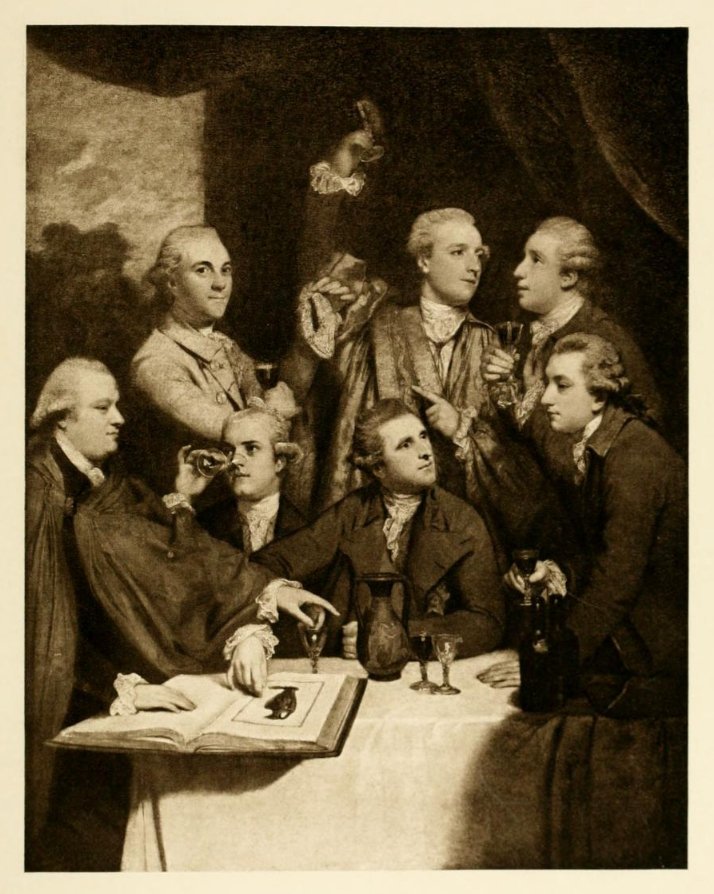23 May 2022
In present-day speech and writing, dilettante usually refers to someone who unseriously engages in an endeavor, one who treats an art or science as a pastime rather than an object of serious and rigorous study. But the word is an early eighteenth-century borrowing from the Italian dilettante, meaning a lover of the arts, which in turn is from the Latin verb delectare, meaning to take delight or pleasure in. And at first, English usage echoed the positive connotation of the Italian word, but within a century the negative sense had developed. (Cf. amateur)
A group of English nobles and gentlemen founded the Society of Dilettanti c.1734 (the exact date of founding went unrecorded—minutes and records of the society were not kept until 1736). The society consisted of men who had made the “Grand Tour” of the Continent and were enamored with European culture and antiquities, particularly those of Italy. Their goal was to promote an appreciation of that culture in England, including bringing objects of interest back to England. In addition to the word, one of their other legacies is the quantity of looted material in British museums.
The Italian word started appearing in general English writing within a handful of years. John Brevel’s Remarks on Several Parts of Europe used it thusly, the italics denoting that the word had not yet fully anglicized:
In an adjoining Chamber I saw a noble Collection of Antiques, which were a Legacy to the Senate, partly from a Patriarch of Aquileia, of the Grimani Family, (a great Dilettante, who had made large Acquisitions in this way in Greece, and the Levant, as well as in Italy) and partly by a Contarini, of the Number of Procurators.
By the latter half of the eighteenth century dilettante had been fully anglicized, as can be seen by its appearance in a 1781 work by Scottish portraitist Allan Ramsay, who commented on the Riot Act using the penname “A Dilettante in Law and Politics.” (Cf. read the riot act) This use also indicates the word had not yet acquired its negative connotation. In calling himself a dilettante, Ramsay was simply indicating that he was not a professional lawyer, rather a painter who dabbled in law and politics.
But the negative sense of dilettante is in place by the early nineteenth century, as can be seen in this passage from Thomas Carlyle’s 1831 satire Sartor Resartus:
The man who cannot wonder, who does not habitually wonder (and worship), were he President of innumerable Royal Societies, and carried the whole Méchanique Céleste and Hegel’s Philosophy, and epitome of all Laboratories and Observatories with their results, in his single head,—is but a Pair of Spectacles behind which there is no Eye. Let those who have Eyes look through him, then he may be useful.
Thou wilt have no Mystery and Mysticism; wilt walk through thy world by the sunshine of what thou callest Truth, or even by the hand-lamp of what I call Attorney-Logic; and “explain” all, “account” for all, or believe nothing of it?
[...]
“Explain” me all this, or do one of two things: Retire into private places with thy foolish cackle; or, what were better, give it up, and weep, not that the reign of wonder is done, and God’s world all disembellished and prosaic, but that thou hitherto art a Dilettante and sandblind Pedant.
Sources:
Breval, John. Remarks on Several Parts of Europe, vol. 1. London: H. Lintot, 1738, 215. Eighteenth Century Collections Online.
Carlyle, Thomas. Sartor Resartus. London: Chapman and Hall, 1831, 1.10, 46–47. HathiTrust Digital Archive.
Cust, Lionel and Sidney Colvin. History of the Society of Dilettanti. London: Macmillan, 1914, 4–5. Archive.org.
Oxford English Dictionary, second edition, 1989, s.v. dilettante, n.
Ramsay, Allan. Observations upon the Riot Act, with an Attempt Towards the Amendment of It. By a Dilettante in Law and Politics. London: T. Cadell, 1781. Eighteenth Century Collections Online.
Image credit: Original painting by Joshua Reynolds, c.1778. Engraving in A Catalogue of the Pictures and Drawings in the National Loan Exhibition. London: William Heinemann, 1909, 12. Archive.org. Public Domain Image.

